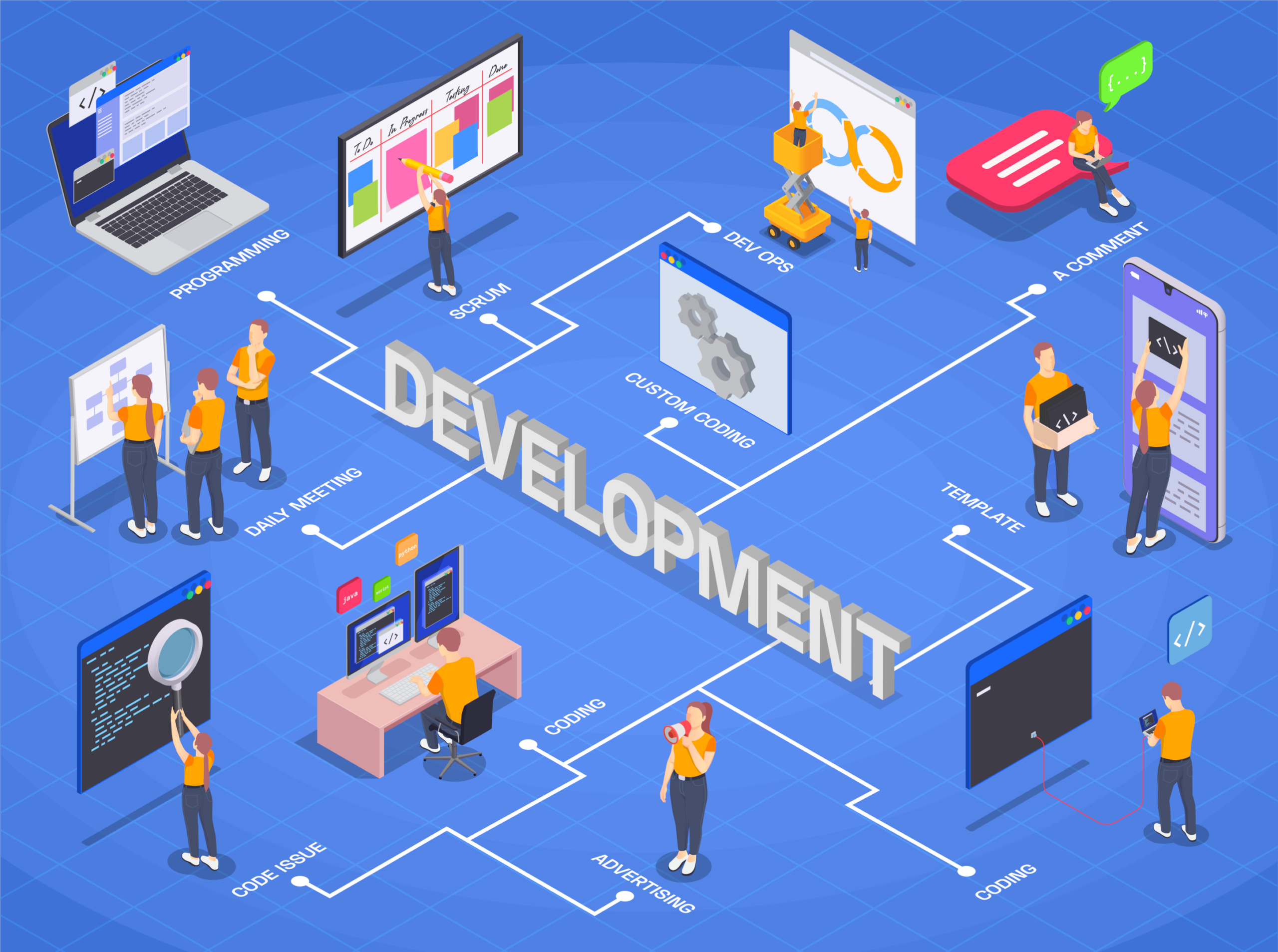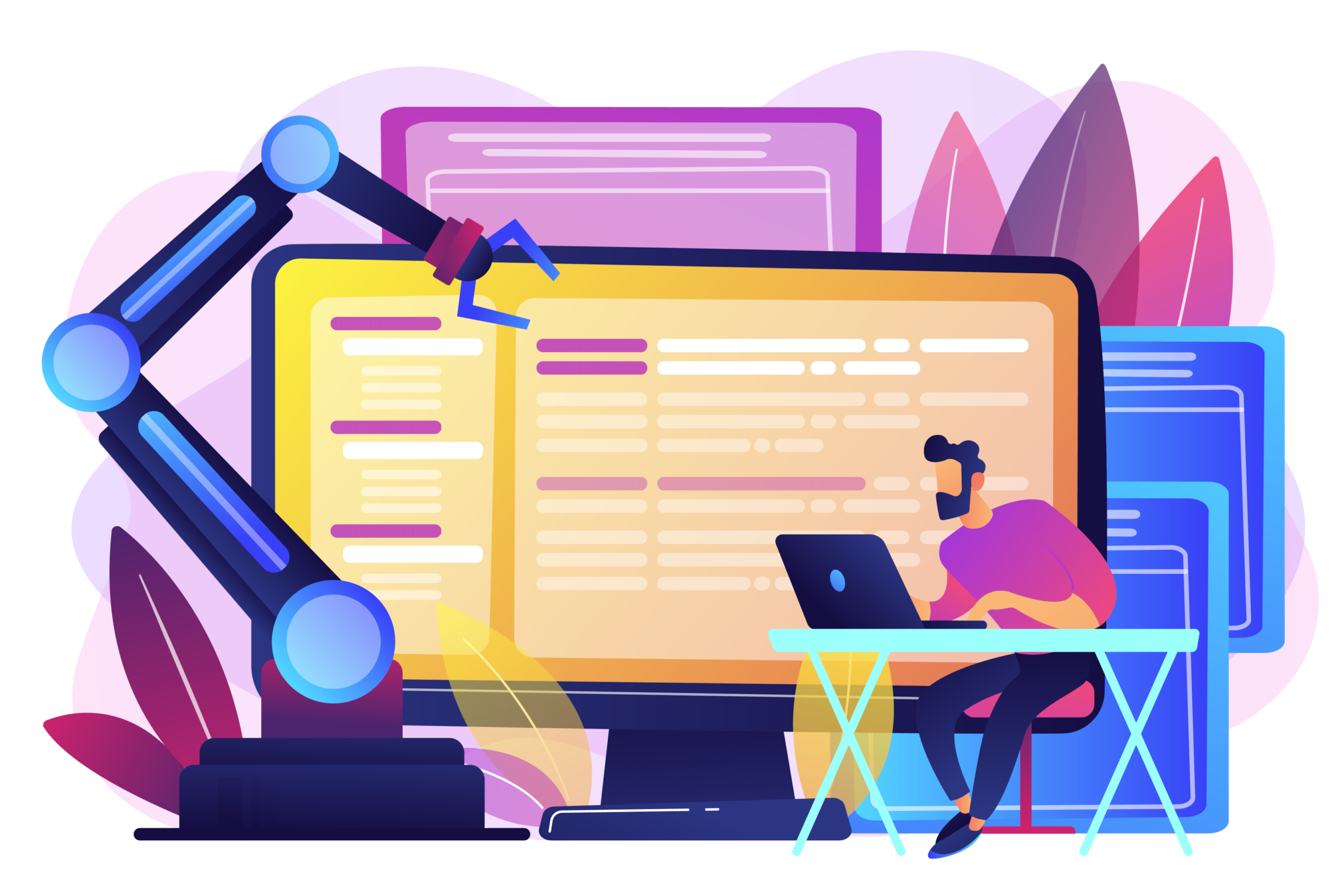In the fast-paced world of technology, keeping pace with the ever-changing and latest software development trends is of utmost importance. The software development industry is in a constant state of evolution, and those who can seamlessly adapt to these advancements are highly sought after. Join us in this article as we delve into the significance of staying abreast of emerging software development trends and the immense impact they can have on your career prospects.

Software Development Overview
Software developers are the driving force behind technological innovation, playing a pivotal role in shaping our digital world. Their expertise is instrumental in crafting the applications and systems that define our modern landscape. Their responsibilities encompass a wide range of tasks, including designing, coding, testing, and maintaining software applications across diverse sectors such as finance, healthcare, entertainment, and more.
Throughout the software development life cycle, these professionals engage in a myriad of activities. They collaborate closely with stakeholders to gather requirements, meticulously design user interfaces, write impeccable code, and conduct rigorous testing to ensure optimal performance and functionality. Their meticulous attention to detail and adept problem-solving skills enable them to develop software solutions that precisely cater to user needs.

Furthermore, the software development field boasts promising prospects in terms of both growth and remuneration. As technology continues to permeate various industries and the demand for innovative software solutions intensifies, software developers can anticipate a flourishing career path. According to the Bureau of Labor Statistics, the occupations associated with developing software is projected to experience a remarkable 22% growth rate from 2019 to 2029—significantly outpacing the average for all occupations. This robust expansion underscores the abundance of opportunities awaiting individuals in the dynamic software development industry.
Key Software Development Roles
Within the software development field, there are various specialized roles that professionals can pursue. Let’s explore some of these roles and the unique contributions they make to the industry.
Applications Software Developer
Applications software developers focus on creating software applications that address specific user needs. They possess expertise in programming languages and frameworks, enabling them to build intuitive and user-friendly applications. From mobile apps to web-based platforms, applications software developers are responsible for translating concepts into functional software products.

Software Engineer
Software engineers adopt a holistic approach when it comes to software development. They harmoniously blend engineering principles with their programming prowess to construct resilient and scalable software systems. Their endeavors encompass an array of tasks, such as meticulously scrutinizing user requirements, crafting software architecture, and optimizing resource utilization. With a forward-thinking mindset, software engineers strive to produce software solutions that go beyond mere functionality, emphasizing maintainability and adaptability to accommodate future demands.

Systems Software Developers
Systems software developers serve as the architects behind the core software that empowers computers and other devices. Their expertise lies in designing and developing essential components such as operating systems, compilers, and device drivers.
These crucial elements facilitate the smooth operation of both hardware and software, ensuring seamless compatibility and optimal performance. Working in close collaboration with hardware engineers, systems software developers strive to optimize system efficiency while maintaining compatibility across a wide range of devices. Their meticulous efforts lay the foundation for reliable and harmonious computing experiences.
Wide Range of Job Titles Available for Software Developers
Beyond the aforementioned roles, the software development industry offers a plethora of job titles catering to a diverse range of specialized skills and areas of expertise.
Examples of such titles include full-stack developer, front-end developer, back-end developer, database administrator, and quality assurance engineer. These designations enable professionals to embark on distinct career paths and uncover their individual niches within the vast realm of software development. The abundance of options allows for exploration and personalization, empowering individuals to find their ideal fit in this expansive field.
The Importance of Tracking Emerging Software Development Trends
In the fast-paced realm of software development, maintaining a competitive edge necessitates a keen awareness of emerging trends. The industry continually embraces cutting-edge technologies, methodologies, and practices to optimize efficiency, elevate user experiences, and tackle evolving challenges head-on. Neglecting to stay abreast of these trends can lead to missed opportunities and hindered career growth, rendering one stagnant in a rapidly advancing field.

Continuous Evolution of Software Development Processes and Practices
Software development processes and practices are in a constant state of evolution. New methodologies and frameworks emerge, promising greater efficiency and improved software quality. For example, Agile and DevOps have revolutionized how software development teams collaborate and deliver value to users. By staying informed about these evolving processes, software developers can adapt their workflows to maximize productivity and efficiency.
Impact of Emerging Trends such as Low-Code, No-Code, and DevOps
Emerging trends like low-code and no-code development platforms are transforming how software is built. These platforms allow developers to create software applications with minimal coding, leveraging visual interfaces and pre-built components.

Similarly, DevOps practices are gaining popularity, emphasizing collaboration and automation to streamline the software development life cycle. Keeping abreast of these trends enables software developers to leverage new tools and techniques, ultimately enhancing their productivity and competitiveness.
Risks of Not Keeping Up with Emerging Trends
Failing to track emerging software development trends can have adverse consequences for professionals in the field. With the rapid pace of technological advancement, outdated skills, and methodologies become less valuable.
Employers seek individuals who can adapt to change and embrace new technologies. By staying informed about emerging trends, software developers can future-proof their careers, remain relevant, and seize new opportunities as they arise.

Resources for Understanding Software Development Trends
To proficiently monitor the ever-shifting terrain of software development trends, it is imperative to have access to dependable resources. Let us delve into a couple of outlets that can furnish invaluable insights into this dynamic landscape.
History of Software Development
Understanding the history of software development is crucial for gaining insights into its current and future trends. Books, articles, and documentaries that delve into the evolution of software development can provide a foundation for understanding the industry’s trajectory. By examining past successes, failures, and paradigm shifts, professionals can better anticipate future trends and position themselves for success.
Insightful Articles on Software Industry Changes and the Role of Developers
Keeping up with industry news and thought leadership articles is an excellent way to stay informed about emerging software development trends. Many reputable websites, blogs, and online publications regularly publish insightful content written by industry experts.
Engaging with these resources allows software developers to broaden their knowledge, gain fresh perspectives, and stay informed about the latest tools, frameworks, and practices shaping the industry.

10 Emerging Software Development Trends You Should Know
Now, let’s dive into ten emerging software development trends that professionals in the field should be aware of. These trends have the potential to shape the future of software development and present exciting opportunities for innovation and growth.
Cloud-Native Application Development
Cloud-native application development involves building applications specifically designed to leverage the benefits of cloud computing. It focuses on scalability, resilience, and rapid deployment. By embracing cloud-native development practices, software developers can create applications that can seamlessly adapt to changing demands and leverage cloud services for enhanced performance and cost-effectiveness.

Artificial Intelligence (AI)
Artificial Intelligence has gained significant momentum in recent years. It encompasses various technologies such as machine learning, natural language processing, and computer vision. AI-powered applications can automate tasks, analyze large volumes of data, and make intelligent decisions. By integrating AI capabilities into their software solutions, developers can unlock new possibilities and create intelligent systems that drive efficiency and innovation.
Blockchain Technology
Blockchain technology, most commonly associated with cryptocurrencies, has far-reaching applications beyond finance. It provides a decentralized and tamper-proof way to record and verify transactions.
In software development, blockchain technology can be utilized for secure data sharing, supply chain management, and digital identity verification. Familiarizing themselves with blockchain concepts empowers software developers to explore innovative solutions in various domains.

Automation
Automation is revolutionizing the very fabric of software development, imbuing it with heightened efficiency and unwavering reliability. By automating arduous, repetitive tasks such as testing, deployment, and monitoring, developers can divert their attention to more strategic and imaginative endeavors. Embracing the arsenal of automation tools and frameworks empowers software developers to harmonize their workflows, curtail errors, and dispense top-notch software with remarkable alacrity.
Cybersecurity
As the digital landscape expands, cybersecurity becomes increasingly critical. Software developers must prioritize building secure and resilient applications to protect sensitive data and prevent unauthorized access. Familiarity with secure coding practices, encryption techniques, and vulnerability assessment tools equips developers with the knowledge needed to create robust and secure software solutions.

Multi-Cloud
The adoption of cloud computing continues to rise, and organizations often utilize multiple cloud providers for their diverse needs. Multi-cloud development involves building applications that can seamlessly operate across different cloud platforms.
Understanding the intricacies of multi-cloud architecture and leveraging cloud-agnostic technologies enables software developers to create flexible and scalable solutions that meet evolving business requirements.
The Internet of Things (IoT)
The Internet of Things refers to the interconnection of everyday objects via the Internet, enabling them to send and receive data. IoT applications span various domains, including smart homes, wearables, and industrial automation.
Software developers need to understand how to build applications that interact with IoT devices, collect and analyze sensor data, and create intuitive user experiences in this connected ecosystem.

Low-Code and No-Code
Low-code and no-code development platforms have democratized software development by empowering individuals without extensive programming knowledge to build applications. These platforms offer visual interfaces, drag-and-drop functionality, and pre-built components, reducing the need for manual coding. Software developers can leverage low-code and no-code tools to accelerate development cycles, empower citizen developers, and prototype ideas rapidly.
DevOps and Agile
DevOps and Agile methodologies have transformed the software development landscape by fostering collaboration, continuous integration, and rapid delivery. DevOps emphasizes automation, cross-functional teams, and shared responsibilities between development and operations.
Agile methodologies promote iterative development, feedback loops, and adaptive planning. By embracing DevOps and Agile practices, software developers can enhance collaboration, accelerate time-to-market, and ensure the delivery of high-quality software.

User Experience (UX) Design
User Experience design focuses on creating intuitive and user-friendly software applications. It encompasses various aspects, including user research, information architecture, interaction design, and visual design. Software developers who understand UX principles can create applications that provide exceptional user experiences, resulting in higher user satisfaction and increased adoption rates.
The Future of Software Development and Career Opportunities
As technology continues to advance, the demand for software development professionals will continue to grow. By staying proactive and actively tracking emerging trends, individuals can position themselves for a successful career in this ever-evolving field. Employers value professionals who can adapt to change and embrace new technologies, making ongoing education and skill development critical.

Conclusion
In conclusion, staying on top of software development trends is essential for professionals who wish to thrive in this fast-paced industry. By tracking emerging trends, software developers can remain relevant, seize new opportunities, and future-proof their careers.
Many prestigious universities offer online programs for students who are interested in developing software; these programs are designed to equip individuals with the necessary skills and knowledge to succeed in this dynamic field. You can easily join one of the countless programs available and take the first step toward an exciting and rewarding career in software development.
FAQs
If you are still skeptical about the prospects of the expanding field of developing software, particularly in the wake of emerging AI technology trends, here are a few frequently asked questions that can address your concerns.
What do I need to be a software developer?
Embarking on the path to becoming a software developer necessitates a sturdy groundwork in programming languages like Java, Python, or C++. Furthermore, obtaining a degree in computer science or a closely aligned discipline can prove advantageous. Cultivating problem-solving prowess, remaining abreast of industry trends, and perpetually refining coding acumen through dedicated practice and continuous learning are indispensable elements for aspiring software developers.
What is an example of software development?
Allow me to illustrate a software development project by taking the instance of crafting a mobile application for a ride-sharing service. This undertaking encompasses an array of tasks, including meticulous user interface design, seamless implementation of ride request and tracking functionalities, seamless integration of payment systems, and meticulous optimization to ensure smooth operation across diverse devices and platforms.
What are the types of software development?
The field of developing software encompasses various types, including application development (mobile, web, desktop), systems development (OS, drivers, firmware), web development (front-end, back-end), game development (graphics, physics, gameplay), and embedded systems development (medical devices, automotive, IoT). Each type serves specific purposes in delivering user-centric solutions and powering computers, websites, games, and specialized hardware devices.
Will AI replace software developers?
While AI continues to advance and automate certain aspects of developing software occupations, it is unlikely to completely replace software developers. AI can assist in tasks like code generation and bug detection, but human creativity, problem-solving skills, and domain expertise remain essential for designing complex systems, understanding user needs, and making critical decisions.
Software developers will continue to play a crucial role in developing innovative solutions, collaborating with stakeholders, and adapting to evolving technologies. AI and human developers are more likely to work together, complementing each other’s strengths and pushing the boundaries of developing software.



